Iranian Media Report Fresh Missile Attack On US Base In Syria
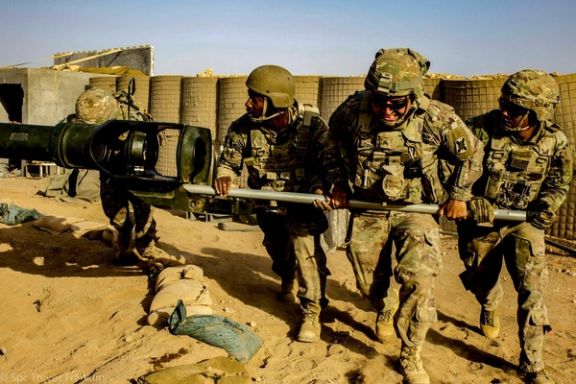
IRGC media report a fresh attack on a US base in Deir Ezzor in Syria on Friday, after US warplanes hit two targets in the region belonging to the Revolutionary Guard.

IRGC media report a fresh attack on a US base in Deir Ezzor in Syria on Friday, after US warplanes hit two targets in the region belonging to the Revolutionary Guard.
Tasnim news agency affiliated with the IRGC reported at midday local time that “six missiles launched from the vicinity of Bu Kamal and al-Mayadeen” at the US base near the al-Omar oil fields.
If true, this would constitute a quick response by Iranian forces to a limited US retaliatory attack launched hours earlier at tow reportedly unmanned weapons depots of the Revolutionary Guard near Bu Kamal.
Iran’s armed proxy forces in Syria and Iraq have launched nearly 20 drone and rocket attacks against US bases in the two countries since the October 7 Hamas terror raid into Israel.
President Joe Biden and other US officials had warned of retaliation if Iranian-affiliated forces continued targeting American forces.
Iran had not attacked US bases in the region for nearly a year before the October 7th Hamas invasion. Tehran was holding secret talks with Washington to free billions of dollars of its frozen funds. The Biden administration agreed to release at least $8.7 billion blocked in South Korea and Iraq since June in exchange for five American hostages held by Iran and reportedly an agreement to deescalate tensions. However, the Hamas attack on Israel have led to the possibility of a serious conflict in the region.
Iran fully backs Hamas and has threatened the United States that if the attack on Gaza does not stop, it can engulf US interests.
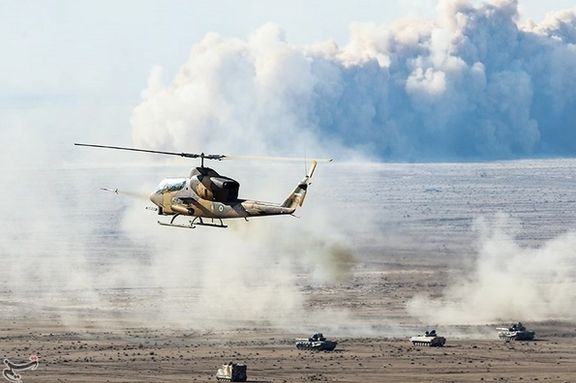
Iranian state media on Friday reported that a two-day military exercise is being carried out in the central Province of Esfahan, amid fears of a wider war in the region.
The ground forces launched a pre-planned drill to test the flight readiness of more than 200 helicopters as tensions in the Middle East rise amid the Hamas-Israel war.
Amir Cheshak, one of the commanders in the military told state media that the exercise aims to test Iran’s response to “possible threats” confronting the country.
Israel and the Islamic Republic are considered as staunch enemies in the region. The rhetoric between the two foes have been more incendiary than usual as the Hamas-Israel war rages on.
Tehran has gone as far as threatening Israel allies if they don’t stop supporting Tel Aviv in the war against Hamas.
Though Cheshak did not elaborate on the details, he told state media that troops and military equipment had been transferred from seven provinces in Iran for the military drill in Nasr Abad region of Esfahan.
The spokesperson said that the drills involve testing various units of the army including missiles, drones, as well as cyber warfare units.
Iran is a supporter of Hams in Gaza and well-armed Hezbollah in Lebanon. The international community has been in fear of the Hamas-Israel war spreading further into the region given Iran’s history of proxy wars.
This week, the Wall Street Journal reported that leading up to the October 7th terrorist attacks by Hamas on Israel, hundreds of the group’s fighters had received combat training in Iran.
The Iranian regime ordered street celebrations as the October 7 attack on Israel was still ongoing and Hamas leaders have thanked Tehran for its military support.
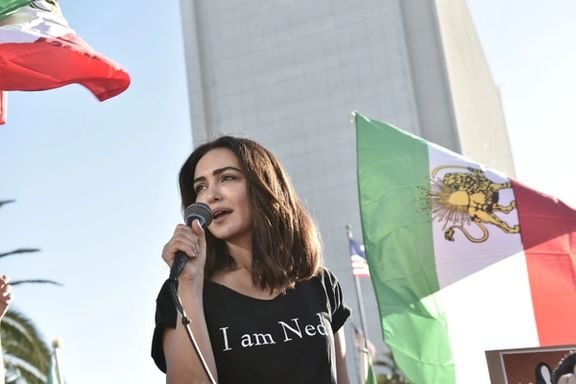
Iranian-born actress and political activist Nazanin Boniadi has criticized the international community for showing leniency towards the Islamic Republic on numerous occasions.
Boniadi is a prominent voice amongst the opposition and has been critical of the United States (US) and European countries for allowing Iranian authorities to use international platforms for spreading propaganda and furthering their malign activities in the region.
Iran’s foreign Hossein Amir-Abdollahian spoke at the United Nations General Assembly meeting on Thursday about brokering a deal regarding the release of the hostages who are being held by Hamas.
Iran’s foreign minister said Hamas is ready to release hostages to the Islamic Republic, and he said the international community must take responsibility for releasing 6,000 Palestinian prisoners held in Israel.
In a post on X, Boniadi went on to criticize the fact that Iran’s foreign minister has been given a platform to talk about hostages when Iran is a well-known practitioner of the hostage-taking crime.
“The international community has incentivized hostage diplomacy and the Islamic Republic and its proxies will continue to use this heinous crime to achieve their political goals as long as the world lets them,” said Boniadi.
In September, the US and Iran made a deal through which five Iranian- American hostages kept in Iran were released in exchange of $6 billion of frozen assets now held in Qatar. The agreement received wide condemnation from US lawmakers and Iranian opposition figures including the former Crown Prince of Iran, Reza Pahlavi.
“Unfortunately, the billions of dollars that the Biden administration will reportedly release to the regime as ransom for five hostages will not reduce the suffering of my countrymen,” said Pahlavi on X.
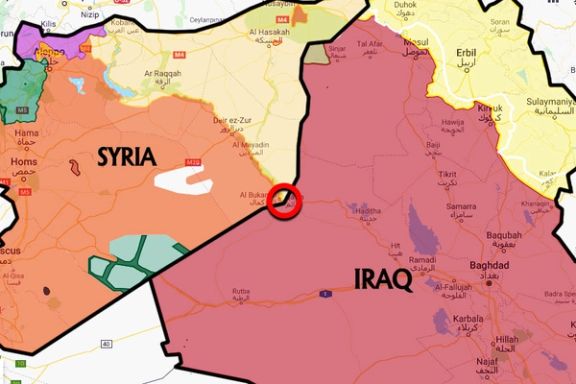
Two US fighter jets struck weapons and ammunition facilities in Syria on Friday in retaliation for attacks on US forces by Iranian-backed militia in the past week.
US President Joe Biden ordered strikes on the two facilities used by Iran's Revolutionary Guard Corps and its militia groups, the Pentagon said, warning the US will take additional measures if attacks by Iran's proxies continue.
US and coalition troops have been attacked at least 19 times in Iraq and in Syria by Iran-backed forces in the past week. Hamas, Islamic Jihad and Lebanon's Hezbollah are all backed by Tehran.
Iranian Foreign Minister Hossein Amir-Abdollahian said at the United Nations on Thursday that if Israel's offensive against Hamas did not stop, the United States will "not be spared from this fire".
Several former US officials, Republican senators and others were criticizing the Biden administration for not responding to the attacks, and for permitting Iran’s foreign minister to come to New York, while his government’s role in the October 7 attack by Hamas was clear.
The US air strikes took place at roughly 4:30 a.m. on Friday (0130 GMT) near Abu Kamal, a Syrian town on the border with Iraq, and were carried out by two F-16 fighter jets using precision munitions, a US defense official said.
"These precision self-defense strikes are a response to a series of ongoing and mostly unsuccessful attacks against U.S. personnel in Iraq and Syria by Iranian-backed militia groups that began on October 17," US Defense Secretary Lloyd Austin said in a statement.
"These Iranian-backed attacks against US forces are unacceptable and must stop," Austin said, directly pointing fingers at the Iranian regime. However, the US response came after days of Iranian-backed attacks that injured scores of US troops. The delay, some argued, was emboldening Tehran.
Biden has sent a rare message to Iranian Supreme Leader Ayatollah Ali Khamenei warning Tehran against targeting U.S. personnel in the Middle East, the White House said earlier on Thursday.
"What we want is for Iran to take very specific actions, to direct its militias and proxies to stand down," a senior US defense official said. The United States did not coordinate the air strikes with Israel, the official added.
The United States has sent warships and fighter aircraft to the region over the last three weeks. On Thursday the Pentagon said about 900 more US troops have arrived in the Middle East or are heading there to bolster air defenses for U.S. personnel.
While the situation in the Middle East remains fluid, the U.S. has taken steps to deter further escalations, deploying two aircraft carriers, additional fighter squadrons, and air defense systems in the region.
In his statement Secretary Austin warned: “if attacks by Iran’s proxies against U.S. forces continue, we will not hesitate to take further necessary measures to protect our people.”
It’s not clear if any Iranians were present at the sites.
Austin has emphasized that the strikes in eastern Syria are "separate and distinct from the ongoing conflict between Israel and Hamas” and do not constitute a shift in the Biden administration’s approach. It is hard, however, if not impossible, to not see the bombing of facilities in Syria against that backdrop.
Israel said on Friday military raids into Gaza were preparing "the next stage of the operation", amid fears that a ground invasion of the Palestinian enclave could spark a wider Middle East conflict.
According to Gaza health authorities, at least 7,000 have been killed in Israeli airstrikes in the 20 days Since the Hamas attack on Israel (which killed 1400), while this figure cannot be independently verified. The regime in Iran has boasted many times about that operation and its support for Hamas.
The Islamic Republic supports several militant groups in the region, most notably Hezbollah in Lebanon. The Biden administration is weary of an all-out war involving these groups, which could be costly, economically and politically. But the continued attack on American forces seems to have taken the President over the decision edge.
Some observers have pointed out on social media that the Biden administration has had far fewer attacks on Iran-affiliated targets than the other way round.
With reporting by Reuters

The reformist Shargh daily in Iran reported that 84 percent of the over 12,000 respondents to its poll on hijab are opposed to mandatory dress code and headscarves.
The online poll, completed over a period of one month, was conducted after lawmakers, mostly affiliated to the ultra-hardliner Paydari Party, ratified a bill in September that they have named "Protection of Family Through Promotion of Hijab and Chastity Culture".
The legislation, originally prepared by the government and later modified by the parliament’s hardliners, proposed various penalties including heavy cash fines for women who do not abide by the prescribed dress code of the Islamic Republic. This dress code consists of a headscarf covering all hair and the shoulders, a loose long tunic with long sleeves, and trousers that cover the legs to below the ankles.
The constitutionally mandated 12-member Guardian Council which, among other things, has the final say in legislation, rejected the bill on Tuesday in a surprising move and asked the parliament to amend it.
The Council has found several formal shortcomings in the text including vagueness of some of the terms used in it, such as a term translatable as “unchastity” or “corruptness”.
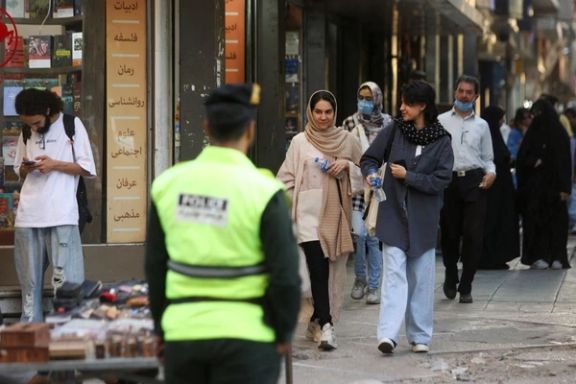
The Council’s rejection of the proposed hijab law has nothing to do with people’s objection to it, Asieh Amini, a Norway-based women’s rights activist, told Iran International. According to Amini, the reason for the Council’s rejection is based on the hardliners’ wish to make the legislation as watertight as possible.
Others believe the Guardian Council may have been apprehensive about increasing the people’s discontent with the regime before the upcoming parliamentary elections in March. The elections four years ago had the lowest participation rate in the four-decade history of the Islamic Republic.
“The outcome of this bill will be nothing other than increasing people’s discontent, decline [of belief] in hijab, and deepening of the rift between the government and the people,” conservative journalist Behrouz Mirzaei-Shirmard tweeted before the Council’s rejection of the bill. He said he hoped “those in the system who are wise and care” would stop the bill, which “is in contradiction with citizen’s rights” from being approved.
In the past few months, hardliners have tried to impose strict hijab rules in government offices, schools and universities, hospitals and other public places. Nevertheless, many women are defying the hijab rules.
For instance, Habib Ilbeigi, the director of the supervision department of the Islamic Guidance Ministry’s Cinema Organization, said that actresses who have defied hijab standards will be banned from acting.

The department has released a list of banned actresses that includes many popular actresses including Baran Kowsari, Vishka Asayesh, Taraneh Alidoosti, Katayoun Riahi, Pantea Bahram, Hengameh Ghaziani and Pegah Ahangarani.
The organization is mandated with the approval of public screening and streaming of all films produced in Iran, and very often implements censorship by rejecting scripts or modifying them.
Sources in Iran say in many places, wearing the hijab now is stranger than not wearing it, as the number of women wearing ordinary clothes and no headscarf has hugely increased.
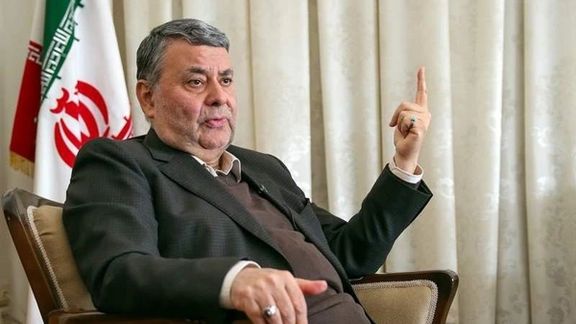
A member of Iran’s Expediency Council says the Islamic Republic does not intend to participate in the Gaza war in spite of funding its proxy Hamas.
Mohammad Sadr told the pro-reform Ham-Mihan daily on Thursday that Tehran will only continue to “exert pressure on Israel's supporters to stop the attacks on Gaza," though the Islamic Republic provides training, weaponry and intelligence to its largest Palestinian proxy.
Hamas declared war on Israel on October 7 after its militia invaded Israel by air, land and sea, killing at least 1,400 and taking at least 220 captive.The majority killed were civilians, including women, children and whole families.
The group, designated by the UK, US and EU, began the operation named the 'Al-Aqsa Flood' with a barrage of at least 3,000 rockets as preparation for what would become the single most deadly day for Jews since the Holocaust.
Israel has been hitting Gaza with a continuous flow of airstrikes and is preparing for a ground offensive as it vows to destroy the Iran-backed proxy.
Sadr warned that if a ground incursion takes place, the risk of escalation is higher, demanding a ceasefire, which Israel claims will only be manipulated by Hamas.
"Current initiatives by certain nations and international bodies aim to broker a Gaza ceasefire and compel Israel to halt its actions. Should a ceasefire be achieved without Israeli ground intervention in Gaza, the prospect of the conflict extending to other nations is highly unlikely," he said.
"However, in the event a ceasefire is not reached, and the Israeli military launches a ground incursion into Gaza, persisting in the extensive casualties among Palestinian civilians, the risk of an escalation of the conflict with involvement of other parties becomes more probable."
Iranian proxy Hezbollah in Lebanon continues to target Israel from its northern border while missiles have been fired towards Israel from its proxies in Yemen and Syria already.